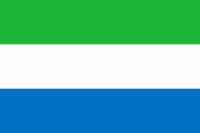Sierra Leone
Sierra Leone became independent from Britain on 27 April 1961. Early independence years were followed by approval in a referendum in 1978 of one-party government.
In October 1990 then President Momoh set up a constitutional review commission to review the 1978 one-party constitution. The commission, recommended the re-establishment of a multi-party system of government. Based on that recommendation, a constitution was approved by Parliament in July 1991 and ratified by referendum in September; it became effective on 1 October 1991. However there was suspicion that president Momoh was not serious about his promise of political reform, as his party's rule continued to be increasingly marked by abuses of power.
The Sierra Leone Civil War (1991-2002) began on 23 March 1991 when the Revolutionary United Front (RUF), with support from the special forces of Charles Taylor’s National Patriotic Front of Liberia (NPFL), intervened in Sierra Leone in an attempt to overthrow the Joseph Momoh government. The resulting civil war lasted 11 years, enveloped the country, and left over 50,000 dead.
The military, which took over responsibility for security following the departure of UN peacekeepers at the end of 2005, is increasingly developing as a guarantor of the country's stability. The armed forces remained on the sideline during the free and fair 2007 and 2012 presidential elections, but still looked to the UN Integrated Peacebuilding Office in Sierra Leone (UNIPSIL), a civilian UN mission, to support the efforts to consolidation of peace.In March 2014, UNIPSIL closed, marking the end of more than 15 years of peacekeeping and political operations in Sierra Leone.
Sierra Leone has a mixed legal system of English common law and customary law.
Sierra Leone has a constitution dating from 1991.

